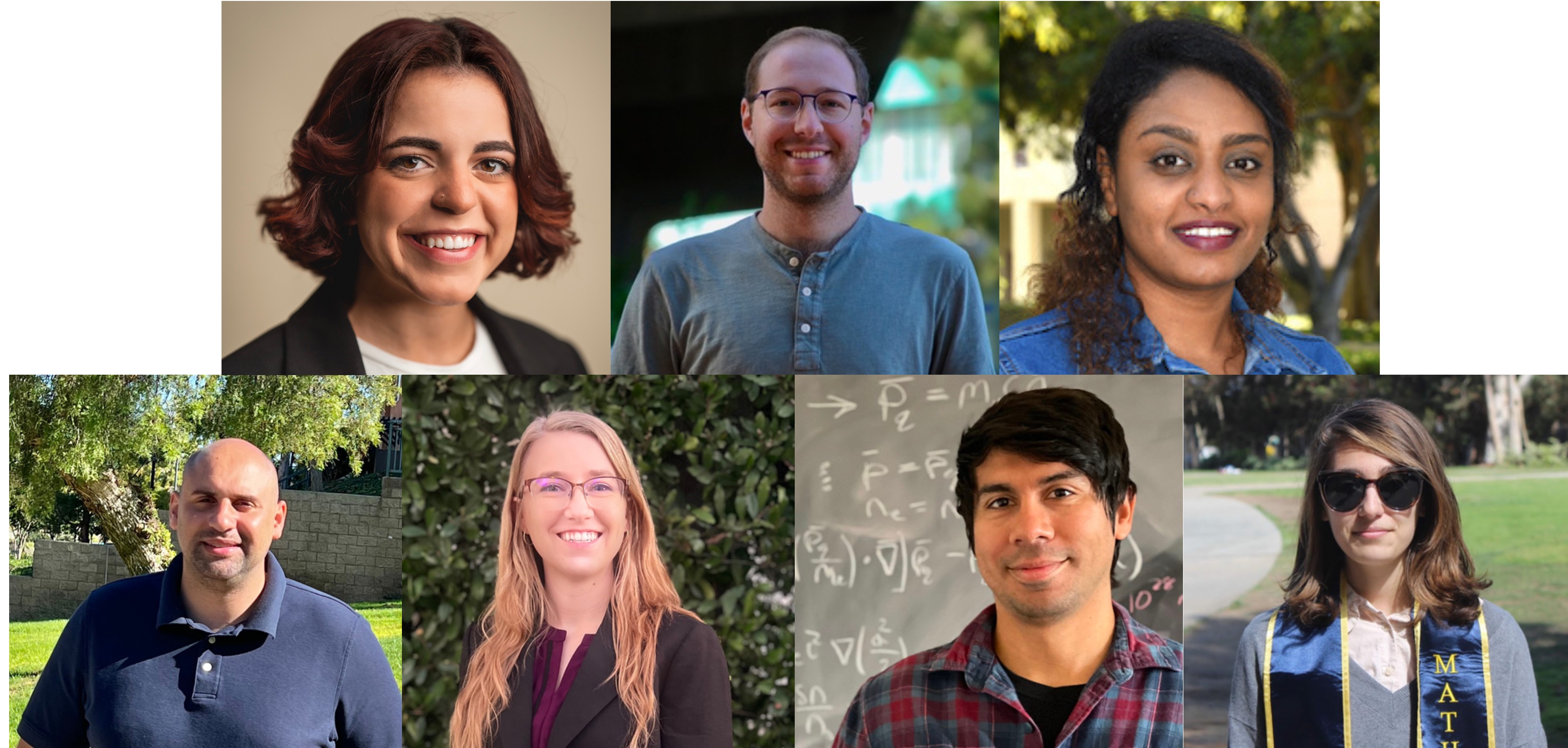The Physical Sciences DEI Graduate Leaders fellows

The UC Irvine School of Physical Sciences DEI Graduate Leader fellows. Clockwise from top left: Savannah Ferretti, Jack Lubin, Nehal Idris, Yasmeen Bake, Ernesto Barraza, Stephanie Stawinski, Ernesto Barraza, DaVante Cain.
The UC Irvine School of Physical Sciences has awarded fellowships called DEI Graduate Leader Fellowships to six graduate students across its four departments. The fellowships provide stipends for a duration of one to three quarters to students so they can create and implement projects meant to foster the principles of diversity, equity and inclusion at the school.
Savannah Ferretti, Department of Earth System Science
Savannah Ferretti aims to build community and cultural competency among Earth System Science (ESS) faculty and graduate students. “In collaboration with the ESS Inclusive Excellence Committee, I advocate for and actively address issues that might cause rifts in the cultural climate of our department,” said Feretti. “To accomplish this, I work closely with ESS DEI Vice Chair Elizabeth Crook and the ESS Graduate Leadership Committee to integrate DEI efforts into our department culture.”
Nehal Idris, Department of Chemistry
Nehal Idris plans to champion diversity by fostering spirituality in the UCI Department of Chemistry and the School of Physical Sciences in general. “I am working with the Associate Dean of Diversity, Equity, and Inclusion, Dr. Mu-Chun Chen, and Vice Chair for Diversity, Equity, and Inclusion Dr. Amanda Holton on finding a space – a dedicated room for spiritual practices that will also provide free resources for students to explore spirituality,” Idris said.
Yasmeen Bake, Department of Mathematics
Yasmeen Bake’s project centers around a conversion of the curriculum of Math 9 to a so-called specifications grading framework. “Mathematics courses usually follow a traditional grading scheme, where most of a student’s grade in the class boils down to performance on a few exams and quizzes,” Bake said. “Specifications grading instead asks students to demonstrate mastery of a set of predetermined course outcomes over the entire quarter. Learning from mistakes is a crucial component of this framework, and every week students are given new opportunities to show that they have increased their understanding of the course material.”
DaVante Cain, Department of Physics & Astronomy
DeVante Cain is running a program called the Young African American Mathematics Program (YAAMP), which “seeks to increase the number of Black students accepted to universities as STEM majors,” Cain said. “Studies show that people who are successful in highly technical fields often have an interest in their area since early childhood or, at the least, since middle school. So, the main objective of YAAMP is to recruit and retain African American middle and early high school students to provide foundational mathematical skills while promoting interest in captivating science subjects.”
Ernesto Barraza, Department of Physics & Astronomy
Erenesto Barraza is developing workshops for the Computational Research Access Network (CRANE) that aim to address the lack of opportunity in the computational physical sciences for marginalized students, students of color and underrepresented students. “We work to create a teaching environment that is inclusive and which allows for students to learn from their mistakes, rather than failing them for mistakes like traditional academic settings,” said Baraaza. “Many DEI initiatives focus on cultural or community changes, which are extremely important. However, these changes cannot be sustained if students are not able to attain the hard skills needed to succeed in scientific fields.”
Jack Lubin and Stephanie Stawinski, Department of Physics & Astronomy and Physical Sciences DEI Graduate Leader Fellows/PACE Osterbrock Fellows
Jack Lubin and Stephanie Stawinski are leadership chairs for the Physics & Astronomy Community Excellence Program (PACE), which aims to help new graduate students in the Department of Physics & Astronomy navigate their degree programs. “The program is trying to do two things,” said Lubin. “Foster community among our grad students across cohorts through peer mentorship and help prepare new physics grad students for their time in grad school.” The key to making the program work, Stawinski expalined, is to focus on building quality relationships between mentors and mentees. “We keep track of how these mentorship programs and workshops are helping students, and adjust to the specific needs for each incoming class,” she said.
